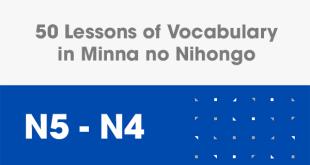Minna No Nihongo Lesson 19 Grammar
Lesson 19 we will learn about the verb form た, is considered one of the important foundations in learning Japanese. Besides, the sentence structure [なります] will also be introduced to us in a different way.
1. The verb form [た]
The verb form [た] is divided like the verb form [て] just change [て] to [た], [で] to [だ]
Group 1 verb
| Verb | form [た] |
| かきます | かいた |
| ききます | きいた |
| およぎます | およいだ |
| のみます | のんだ |
| あそびます | あそんだ |
| まちます | まった |
| とります | とった |
| あいます | あった |
| はなします | はなした |
Group 2 verb:
Bundle [ます] and add [た] later
For example:
たべますーーー>たべた
ねますーーーー>ねた
Group 3 verb:
しますーーーー>した
きますーーーー>きた
2. The verb form [た]こと + が あります
Meaning: Once
Usage: talking about an experience you have encountered and experienced in the past. Describe the infrequent occurrence
For example :
あなたはにほんへいったことがありますか。
Have you ever been to Japan?
いいえ、(いちど)ありません。
Not yet, never
おさけをのんだことがありますか。
Have you ever drunk alcohol?
はい。あります/ はい、2回(かい)あります。
Yes, ever / Yes, twice.
3. The verb form [た] り 、 The verb form [た] り + します
Meaning: what to do, what to do …
How to use :
List some representative actions among the many actions that the subject performs without chronological order, no matter which happens first, which happens later.
The tense of the sentence pattern is indicated at the end of the sentence.
For example :
にちようびそうじ)したり、せんたくしたりします。
On Sundays I clean the house and wash clothes, etc.
きのう こうえんをさんぽしたり、レストランでしょくじしたりしました。
Yesterday I went for a walk in the park and ate at a restaurant, etc.
まいばんおんがくをきいたり、かんじをか)いたりします。
Every night I listen to music, write kanji, etc.
4. なります
Meaning: to become, to become to indicate a change in state
Adjective tail [い]
Remove ending [い] and replace it with [く] + [なります]
For example:
さむいーーー>さむく なります
Refrigerate
Adjective tail [な]
Remove ending [な] and replace it with [に] + [なります]
げんき(な)ーーー>げんきになります
Become well
Noun
Add [に] + [なります]
For example :
25さいになります
Turning 25
5. そうですね
How to use :
Used to indicate agreement or sympathy with what the conversation partner said because he knew it or meant it
We can express the same thing when we say [そうですか] when we lower our voice at the end of the sentence.
For example :
さむくなりましたね。
It’s getting cold already
。。。そうですね!
Yes, that’s right!
Related Post: Minna No Nihongo Lesson 19 Vocabulary
 Learn Japanese Free Learn Japanese Free
Learn Japanese Free Learn Japanese Free







